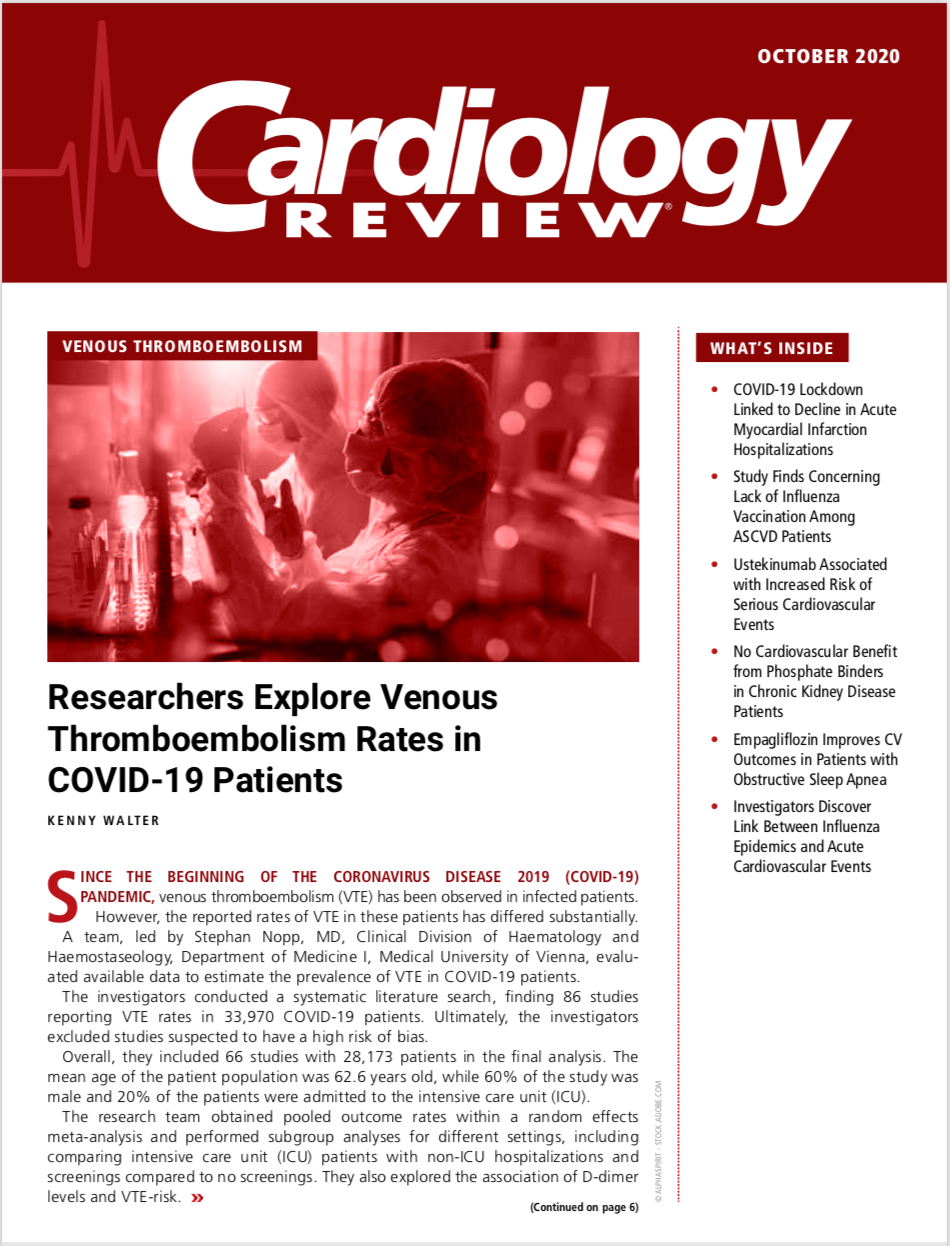Publication
Article
Cardiology Review® Online
COVID-19 Lockdown Linked to Decline in Acute Myocardial Infarction Hospitalizations
Author(s):
This decrease in hospital admissions had no association with regional prevalence of COVID-19.
Jules Mesnier, MD

New data analysis of the ongoing French Cohort of Myocardial Infarction Evaluation (FRENCHIE) registry reveals a decline in hospital admission for acute myocardial infarction following the coronavirus disease 2019 (COVID-19) lockdown.
Although the reasons for such findings can only be speculative, the investigators noted that this marked decrease should encourage public health officials to provide appropriate messages that especially target those that are wary of utilizing health services during the pandemic.
Jules Mesnier, MD, of the University of Paris, and colleagues used registry data to quantify changes in myocardial infarction-related hospital admissions following the lockdown in France. Their assessment also compared admission changes between patients with ST-elevation myocardial infarction (STEMI) and non-ST-elevation myocardial infarction (NSTEMI).
The FRENCHIE registry, which includes 21 participating centers, captures within 48 hours of symptom onset patients who present with either STEMI or NSTEMI. Therefore, Mesnier and colleagues used this timeframe to define recent acute myocardial infraction.
The investigators collected data over an 8-week period, which covered 4 weeks preceding lockdown and 4 weeks following it.
Patients admitted to the hospital due to COVID-19 who had subsequently developed myocardial infarction were excluded in their analysis. On the contrary, patients admitted for myocardial infarction who were then diagnosed with COVID-19 were included.
The primary outcome sought by the investigators was change in number of hospital admissions for all types of myocardial infarction, NSTEMI, and STEMI between the weeks preceding and following lockdown.
Additional objectives included further subgroup analyses of admission change and overall change in mortality between both periods.
Thus, the team reported that between February 17 and April 12, 2020, a total of 1167 patients were consecutively admitted to the hospital for recent acute myocardial infarction. Of the total, 583 had STEMI and 584 had NSTEMI.
Overall admission decreased from 686 to 481 between the periods (-30% [incidence rate ratio, 0.69; 95% CI, 0.51-0.70]).
Furthermore, admissions for STEMI decreased from 331 to 252 (-24% [IRR, 0.72; 95% CI, 0.62-0.85]), and admissions for NSTEMI decreased from 355 to 229 (-35% [IRR, 0.64; 95% CI, 0.55-0.76)].
Patients who were ≥80 years (n = 208) had a more noticeable decline than those who were younger (IRR, 0.64; 95% CI, 0.48-0.86).
They also noted that this decrease in admission had no association with regional COVID-19 prevalence or subgroup characteristics, such as gender, history of diabetes, history of hypertension, and smoking habits.
In-hospital mortality was numerically higher after the lockdown than before it—25 (5%) of 481 patients vs 23 (3%) of 686, respectively. However, the team did not consider it statistically significant.
Such trends, therefore, may likely be attributed to patient fears of exposure to the virus in the hospital.
“These concerns might have been amplified by the general message that people should stay at home.,” they wrote.
Another notable explanation may involve reduced exposure to air pollution, a known trigger of acute myocardial infarction. The investigators did not consider both explanations to be mutually exclusive.
Mesnier and team acknowledged a need to conduct the study with a longer survey period beyond the first month and after the end of lockdown.
“Meanwhile, health authorities should be fully aware of the current situation in order to deliver appropriate public health messages,” they concluded. “This is crucial in countries still fighting COVID-19, but also in the case of a second wave in countries that are past the first wave of the pandemic, or in case another pandemic occurs in the future.”
The study, “Hospital admissions for acute myocardial infarction before and after lockdown according to regional prevalence of COVID-19 and patient profile in France: a registry study,” was published online in The Lancet Public Health.
































